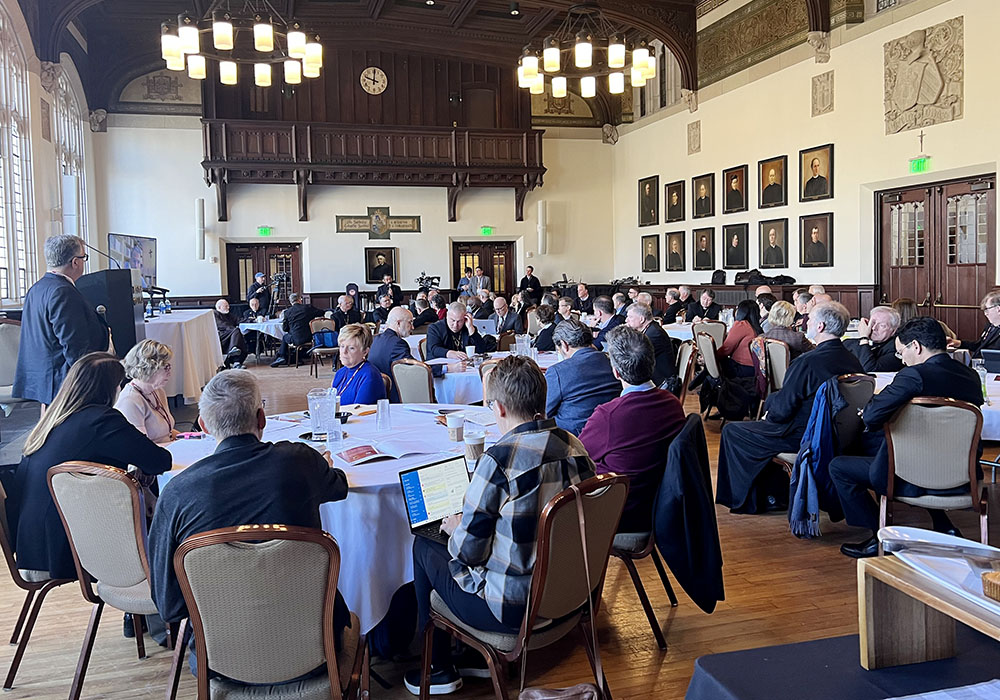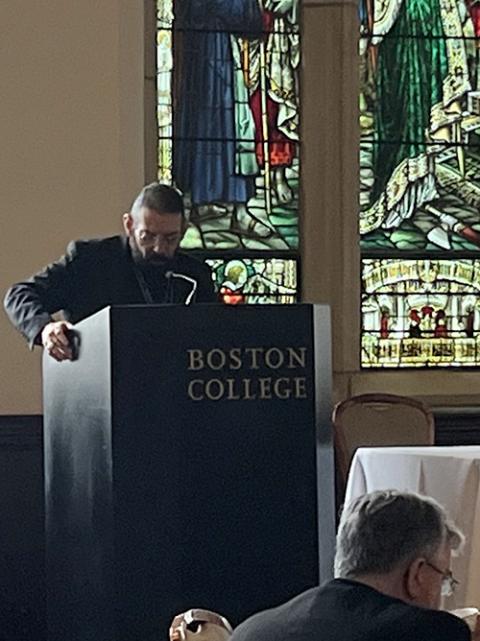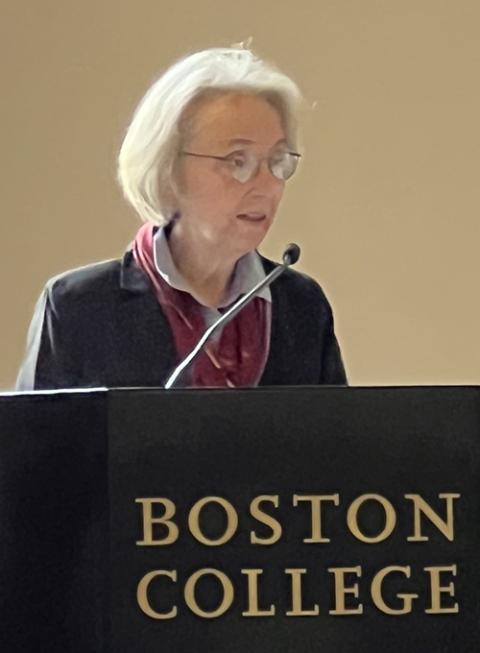
Dozens of theologians and U.S. bishops attend the conference "The Way Forward: Pope Francis, Vatican II, and Synodality," held March 3-4 at Boston College. (Courtesy of Boisi Center for Religion and American Public Life)
For the second consecutive year, dozens of theologians and bishops from across the United States gathered together to discuss how the Catholic Church can better live out the synodal path that Pope Francis has said is what "God expects of the church of the third millennium." The conference, "The Way Forward: Pope Francis, Vatican II, and Synodality," was held March 3-4 at Boston College.
Several bishops over the event's two days were forthright in describing their thoughts and experiences during the local consultative process of the 2021-23 Synod of Bishops on synodality, noting challenges during the process and some resistance to the synod. (The bishops spoke in conversations that were under the "Chatham House Rule," meaning that journalists covering the event were free to report on the discussions but not identify who made any particular comment. The rule is intended to encourage open and frank discussion.)
One bishop said he felt a tension between listening to people's unvarnished thoughts about the church and his understanding of his role to be a "conservator" or defender of Catholic doctrine.
Another bishop commented that better catechesis must be a part of the synodal process moving forward because most participants in his diocese saw the Catholic Church more as an institution than a spiritual communion.
'It is not enough simply to maintain and adapt what has existed until now; it is necessary to create something new.'
—Rafael Luciani
A different bishop said the synodal listening sessions in his diocese became forums for people to air their grievances against the church, more so than their hopes. That bishop added: "The people of God need to be grounded in the sacraments, and need to be truly able to express their faith, which is why I think there will be more of these listening sessions to get to the deeper reality of faith."
One bishop from the Midwest spoke of the need for a deeper understanding of the 1962-65 Second Vatican Council among the laity and clergy. He also said the church needs to learn from its mistakes, among which he suggested was a liturgical reform that was too abrupt after the council.
Of synodality, the bishop added: "How we do this is very important, because the goal is to actually have a changed church, not to score points. We should be a bit more disciplined and a little more realistic about what our goals are."
Several of the keynote talks and follow-up discussions acknowledged the resistance toward the synod in some corners of the U.S. church.
One bishop suggested that the pope's message on synodality was being hampered in large part by fundamentalist-leaning Catholic apologists who have used social media platforms in a harmful manner.
Advertisement
A Catholic scholar added that professional Catholic apologists often "forget that the truth is a person, not a proposition."
In keynote presentations that were on the record, speakers reflected on how synodality presents an opportunity for Catholics to live out Vatican II's vision of a church where all the baptized share in the common mission to evangelize.
"Synodality expresses a new way of being and proceeding in the church that has its point of departure but also its point of arrival in the people of God," said Rafael Luciani, a Boston College theologian. Luciani delivered the conference's first keynote address, in which he presented synodality as a new phase in the church's reception of Vatican II.
Luciani, who serves as an expert on the Theological Commission of the Vatican's General Secretariat of the Synod of Bishops, told the audience that a "synodal ecclesiality" is emerging, and that Catholics the world over are facing a common challenge to build a "synodal church for the third millennium."
"It is not enough simply to maintain and adapt what has existed until now; it is necessary to create something new," Luciani said.
Fretting over synodality overlooks the fact, several conference speakers added, that synods have been a part of the church's life from its beginning. Robin Darling Young, a professor of church and Christian history at the Catholic University of America, presented a historical overview in which she noted that the church had already experienced more than 200 regional synods by the fourth century.
"The synod was not invented by Constantine, it was not an invention of the Roman Empire," said Young, who added that the first Christians adopted secular customs, such as convening councils, to govern their communities.
"This is deeply rooted in early Christianity," Young said of the church using synods and councils where the faithful, laity and clergy, met to respond to various issues. In several of those gatherings, Young said, educated women participated and served as theological advisers.
Other keynote speakers included Hosffman Ospino, a Boston College theology and religious education professor who discussed practical and pastoral theology, and Bishop Daniel Flores of Brownsville, Texas, who presented on "Collegiality, Synodality, and the Pastoral Vision of Pope Francis."
While rooted in the church's tradition, synodality was interrupted over the centuries by political dynamics, racial and linguistic divisions, and other challenges that "made it difficult to sit down and just be happy with the fact that we all in some way" are connected to the church, Flores said.

Bishop Daniel Flores of Brownsville, Texas, speaks on "Collegiality, Synodality, and the Pastoral Vision of Pope Francis." (Courtesy of Boisi Center for Religion and American Life)
"If we're going to take [synodality] seriously, then we have some serious work to do," he said.
Along with Flores, other church leaders who attended the conference included Cardinals Sean O'Malley, Joseph Tobin and Donald Wuerl; Archbishops Mitchell Rozanski, John Wester, Paul Etienne, Charles Thompson and Borys Gudziak; and Bishops Earl Fernandes, Mark Seitz, Christopher Coyne, John Dolan, Shawn McKnight, Luis Zarama, Mark O'Connell and Robert Coerver. Also present was the Vatican's ambassador to the U.S., Archbishop Christophe Pierre.
Theologians and other scholars who attended included Kathleen Sprows Cummings of the University of Notre Dame; Massimo Faggioli of Villanova University; Jaisy Joseph of Villanova University; Therese Lysaught of Loyola University Chicago; Cathleen Kaveny of Boston College; John McGreevy of the University of Notre Dame; Aristotle Papanikolaou of Fordham University; Susan Reynolds of Emory University; Mark Massa of Boston College and Maria Clara Bingemer of the Pontifical Catholic University of Rio de Janeiro.
The conference was co-organized by Loyola University Chicago's Hank Center for the Catholic Intellectual Heritage, Boston College's Boisi Center for Religion and American Public Life, and Fordham University's Center on Religion and Culture. NCR political columnist Michael Sean Winters also helped organize this year's event, as well as the first of its kind in 2022 at Loyola University Chicago. Boston College hosted the 2023 gathering.








